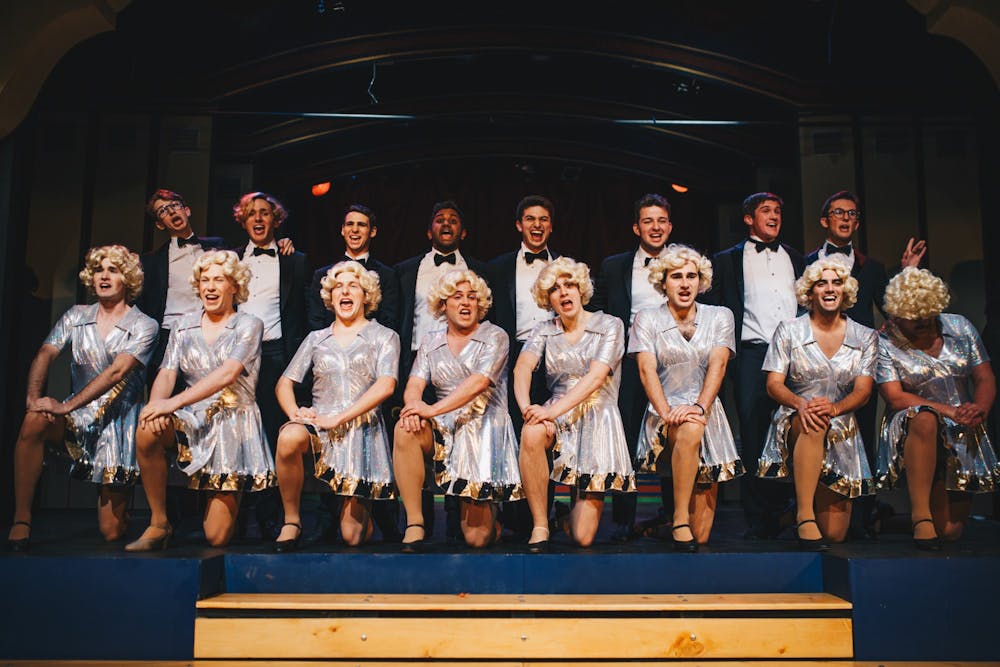As the Black Lives Matter movement continues to grow across the country, Penn’s oldest performing arts groups including Penn Glee Club, Penn Singers, and the all-male comedy troupe Mask and Wig Club are making efforts to become more inclusive and address the racism rooted in their history.
Penn Glee Club and Mask and Wig were founded in 1862 and 1889 respectively as all-white groups, while Penn Singers was founded in 1957, after Penn had been integrated for longer. Students and alumni have alleged that Mask and Wig used blackface, makeup used by a nonblack performer to play a Black role, and racist caricatures in past performances. In an effort to be more inclusive, these groups have changed the types of shows they perform and their casting processes over the past several years.
Mask and Wig released a statement condemning inequality and supporting the Black community on Instagram on June 2 in response to the death of George Floyd. 2019 College graduate Fiona Jensen-Hitch commented on the post asking whether Mask and Wig will take down photos in their clubhouse of past members in blackface. Mask and Wig replied that all racist caricatures in their clubhouse have been covered as of January and that a statement acknowledging the group’s history hangs in the building.
“We’re not trying to rewrite history,” Mask and Wig Undergraduate Chair and rising College and Engineering senior William Deo said. “We acknowledge our past but at the same time, it’s important to recognize that we can’t change it. Our focus, obligation, and dedication should be on a better future.”
Deo said that, as of two years ago, Mask and Wig started doing their annual free show jointly with Bloomers to attract an audience with a more diverse range of interests. He added that Mask and Wig also donates tickets to the Platt Community Ticketing Program to allow low-income students to attend shows for free.
The Mask and Wig clubhouse was built in 1834 as St. Paul's Evangelical Lutheran Church — the first African-American Lutheran congregation in America — by Jehu Jones, a formerly enslaved person and the first African-American Lutheran minister. When Jones could no longer afford the mortgage on the church, it was sold twice before Mask and Wig bought the church in 1894.
Penn Pipers is a subset of the Glee Club founded in 1950 that covers a wide range of music from barbershop and vocal jazz, to contemporary and pop songs. Former Penn Pipers member and 2018 College graduate Mack Finkel said that in the 1900s, former director of musical activities at Penn, Bruce Montgomery, directed Penn Glee Club, musical theater company Penn Singers, and Mask and Wig. Finkel said Montgomery wore blackface in several of his performances.
“Glee Club is very reverent of [Montgomery],” Finkel said. “Every new member gets a book that he wrote about the Glee Club.”
RELATED:
For Juneteenth, Penn urges community to use day off to reflect on systemic racism
‘A fundamentally broken system’: Why protesters are calling to 'defund the police'
Finkel added, however, he does not believe the Glee Club ever wore blackface in shows because they did not perform theater.

The Glee Club President and rising Wharton senior Jake Milner said the Glee Club used to only be a singing group but has since added a band and technical staff in order to attract a more diverse audition pool and increase the diversity of the group.
Milner added the Glee Club is reviewing their audition process to prepare for the possibility of virtual auditions in fall 2020 and is working to ensure that students with limited access to technology and instruments have the opportunity to join the group.
Former Singers member and 2020 Wharton graduate Siani Woods said she was one of three Black performing members when she joined the group and the first Black woman to be the lead in a Singers show in 2017. Under the direction of Bruce Montgomery, Woods said Singers would regularly perform The Mikado, a Gilbert and Sullivan opera in which actors wore yellowface, darkening their faces to appear Asian.
Their revised constitution states they are no longer allowed to perform The Mikado, she added.
Former Singers President and 2019 College graduate Rafael Flores said Singers has poorly treated and represented people of color in the past. In 2007, the group recruited Black students for the show “Ragtime” because it required a lot of Black cast members. He said that once the show was over, the recruited Black students were forgotten about and were not integrated into or supported by the group.
During his time in Singers, Flores added that directors would often mix up the names of Black members. He added that they were sometimes forced to wear wigs to cover their natural hair for shows that only had white characters.
Woods said that in 2018, Singers instituted a “show reviewal process” in which a board member reads through a script before choosing to perform it to screen for any racist or sexist caricatures.
“The arts at Penn is something that I feel so lucky to have been a part of,” Woods said. “I love theater at Penn but it can be doing more to be better, and I really hope it does.”
Correction: A previous version of this article incorrectly stated that Mask and Wig acquired their clubhouse directly from Jehu Jones, when in fact, there were two owners in between Jones and Mask and Wig. The DP regrets this error.









